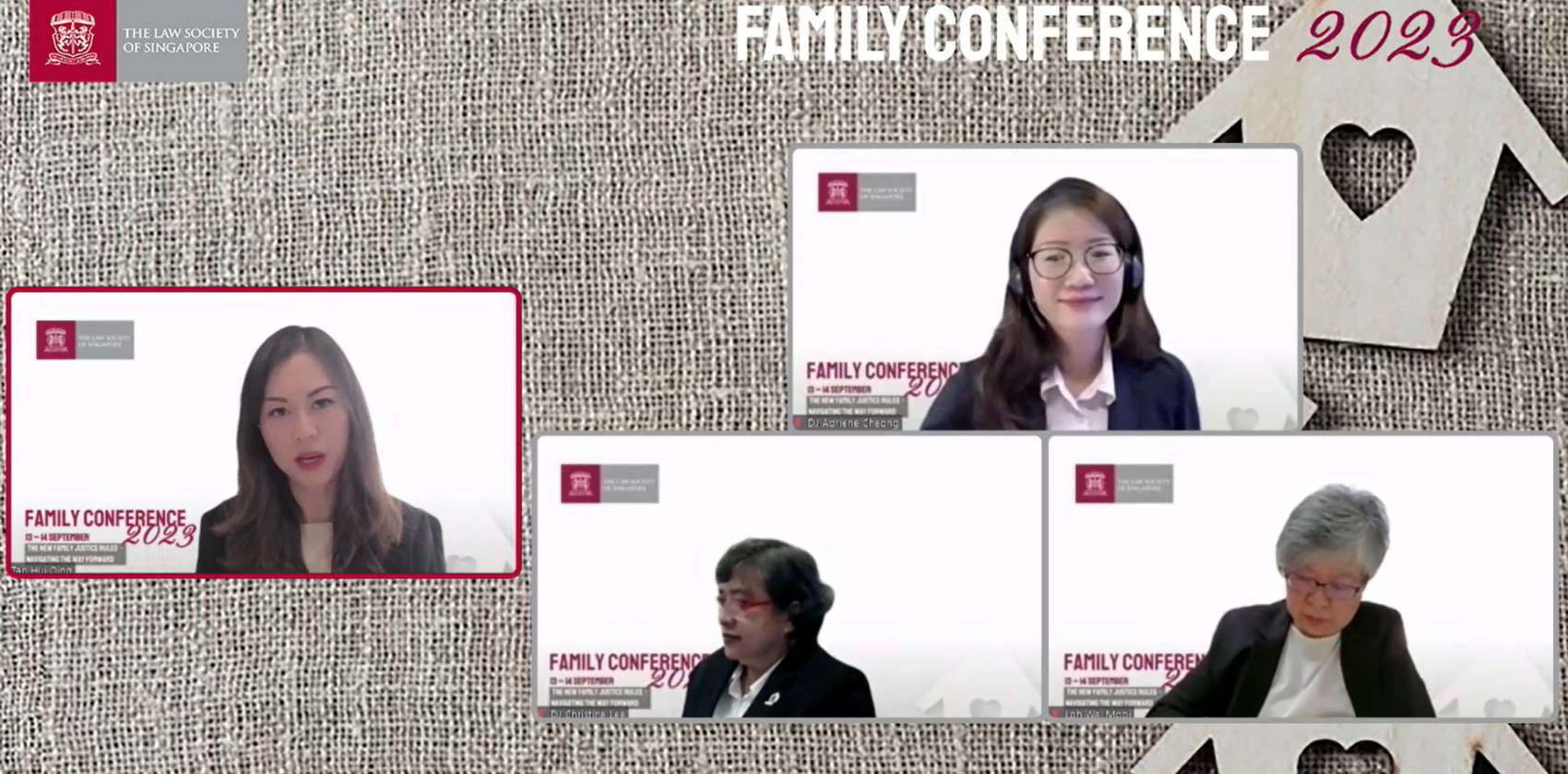
Family Conference 2023
Navigating the Way Forward with the New Family Justice Rules
Amidst the sea change in the family justice ecosystem of recent years, the family justice community came together again for the Family Conference 2023 over 13 and 14 September 2023. With past iterations of the annual conference covering successive waves of developments from the formal introduction of therapeutic justice (TJ) to the new interdisciplinary initiatives and Women’s Charter legislative amendments, this year’s conference looked to the upcoming anticipated new Family Justice Rules – what Registrar Kenneth Yap (Registrar Yap) poetically called the “new skin” for “new wine”.
A “new skin” the new Family Justice Rules may be; “skin deep” the changes are not. As the in-depth analysis and discussions of the conference showed, the overhaul is to be a remodelling of the vessel conducting the flow of cases through the Court in keeping with the “new wine” of TJ. Attendees heard from esteemed members of the bar and the judiciary, the co-creators of the new rules themselves, over six plenary sessions covering the stages in a life cycle of a case from originating processes, through discovery and hearing, and appeals in turn, ending with judge-led powers and advocacy.
Day 1 Introductory Remarks by the Honourable Justice Debbie Ong, then Presiding Judge of the Family Justice Courts
The introductory remarks of the Honourable Justice Debbie Ong (Justice Ong), then-Presiding Judge of the Family Justice Courts (FJC), carried special significance for the family justice community this year. Having led family justice in Singapore through the dawning of the “New Day” and into the “New Tomorrow” of TJ, Justice Ong opened the conference at the close of her own time as the Presiding Judge of the FJC, and this was the last time Justice Ong would publicly address the family justice community in her capacity as Presiding Judge.
On this occasion, Justice Ong took the opportunity to fortify family lawyers in their new roles which she likened to that of doctors, listening and making a “diagnosis”, conscious of their “bedside manner”, always, she emphasised, to engender a measure of healing. As a prelude to the conference sessions, her Honour recalled the key milestones of the FJC that have led to the promulgation of the anticipated new rules today. Her Honour underscored the driving reason behind TJ to safeguard the welfare of children, and how family lawyers have to help parties put the past behind them and joint parent in the best interests of the children. Her Honour concluded by stressing how family lawyers have a job with a purpose, as first responders when a family is in crisis, to offer the human touch and assurance.
Session 1 – CJ Koh Family Law Lecture – “New Rules”: Because New Wine Requires a New Wine Skin
Kicking off the first session of the conference, Registrar Yap provided a comprehensive exposition on the motivations for the changes to the Family Justice Rules, the understanding and principles underpinning the changes, and the key differences to be expected from the new rules. He shared that the “simplification” of the rules in the new Family Justice Rules is intended to allow for a ‘just, expeditious and economical disposal’ of cases, with the new rules arranged according to the life cycle of the case to allow court users (including practitioners and litigants-in-person) reference to the rules clearly.
In particular, Registrar Yap shared how the judge-led approach has been expanded for judges to allow for oral applications in lieu of formal summons and for the courts to make substantive orders of its own motion without formal summons to address immediate or urgent needs of the family in the interests of justice. Judges will also be empowered to disallow the filing of further applications and/or documents to de-escalate litigation if it impedes the just, expeditious, or economical resolution / disposal of the matter, or if has an adverse effect on the child(ren). As Registrar Yap noted, the ultimate goal of family justice is to help parties “find closure, move forward and build two happy homes”.
Session 2 – “Let’s Get It Started”: Originating Processes
With Registrar Yap’s overview of the new rules as a backdrop, moderator Ms Poonam Mirchandani led District Judges Edmund Chew (DJ Chew) and Yarni Loi (DJ Loi), and senior practitioner Ms Kee Lay Lian in a discussion on how the new rules will change the landscape of family law, the way family lawyers run their cases, and their impact on clients and their families, starting particularly with originating processes.
As a matter of organisation, DJ Chew shared that the new rules will be split into three volumes: Family Justice (General) Rules, Family Justice (Probate and Other Matters) Rules, and Family Justice (Protection from Harassment) Rules. This thematic separation of the rules, DJ Chew said, allows for them to be easily accessed by court users. The consolidation and streamlining of the rules in this regard was also intended to reduce the number of documents filed greatly. Where there are exceptions to the rules for the particular type of application, they will be provided for within the relevant part itself so as to make it more accessible, for example, the unique provisions for the adoption of children found in Part 7 of the draft Family Justice Rules.
DJ Loi shared the TJ journey to date and how TJ hardware tools are also being introduced into the court processes to reduce adversarial litigation and encourage problem solving between parties. This includes two triage tools – the Joint Triage Checklist (JTC) and TJ Cooperative Conference (TCC) – to categorise cases and apply the right resources and tools to the appropriate case and at the appropriate time. For example, if settlement is already imminent, less resources will be applied, whereas more complex acrimonious cases may benefit from Teams – a multi-disciplinary, collaborative team to see the case from the start to the end. Whilst the JTC will be introduced for all new divorce filings, TCC and Teams will only be introduced for a proportion of cases (with a sandbox approach to start with).
Session 3 – “Give A Man A Fish”: On Fishing Expeditions and All Things Discovery-Related
Moderator Ms Linda Ong opened the session by reflecting on what “discovery” really means for us as family lawyers, not the exploration of unchartered territories or uncovering of the universe’s secrets that ignites excitement in explorers and scientists, but the more mundane yet essential “disclosure” of bank statements, income documents, and receipts. The question addressed to the panel comprising Ms Lim Hui Min (Ms Lim), and Assistant Registrars Keziah Simon (AR Simon) and Tan Zhi Xiang (AR Tan) was to what extent “disclosure” under the new rules was more than a name change, and would change the process of “discovery” as we knew it.
Ms Lim, a former District Judge of the FJC, whose cases decided some 20 years ago remain relevant today, observed that fundamentally the spirit of discovery or disclosure to build trust through transparency remains the same. This is the foundation of TJ and was not going to change. The need for reasonable disclosure, however, would need to be balanced against the expense of too much time, money and effort being expended on processes which would also not be therapeutic.
AR Simon pointed out that whilst the change in nomenclature may be subtle, the changes to the rules made them more understandable and accessible for parties. There would be no distinction between interrogatories or discovery under the new rules, the commonality between both being disclosure (be it of information or documents), and Part 9 Rule 3 of the new Family Justice Rules set out a mandatory standard list of documents specified in the forms which would have to be disclosed by default. This was what AR Simon referred to as the “positive” part of the rules and was complemented by the “negative” part in Part 9 Rule 7 which provided that the Court would not grant disclosure of documents or information in possession, control, or knowledge of the party seeking such disclosure.
AR Tan presented that processes would be simplified under the new Rules as there would no longer be a need to serve requests before filing the discovery summons. The requesting party could directly file their summons for disclosure following the Ancillary Matters Affidavit and the other party would make any voluntary disclosure if any. In effect, however, panellists agreed that what parties would be required to disclose was not necessarily changed by the new rules, with the fundamental principle referred to by both AR Simon and AR Tan being that he who asserts must prove. AR Tan pointed out that the new rules do not limit what a party can disclose as such, and that if a document was essential to a party’s own case, then he or she should disclose it.
Of note, attendees learned that inasmuch as “fishing expeditions” are frowned upon, the new rules would soon put the brakes on the “train of inquiry” except in special cases. Ms Lim’s view on this was that given the new provision against “train of inquiry” discovery generally, parties really needed to be a lot more thoughtful about what their case theory is and put forward a much stronger narrative to justify what and why such documents were required. In closing the session, panellists shared their top tips for dealing with disclosure applications going forward with AR Simon and AR Tan asking that parties be very clear in what document(s) and what time frame is sought, and bear in mind the objectives of the disclosure process respectively.
Session 4 – “Great Divide”: Deciphering the Appointment of Experts, and Mastering Ancillary Matters
Ms Tan Hui Qing moderated the session on the appointment of experts and ancillary matters. She was joined by panellists District Judges Adriene Cheong (DJ Cheong) and Christine Lee (DJ Lee), as well as senior practitioner, Ms Loh Wai Mooi (Ms Loh) who shared their top tips and takeaways in anticipation of the new rules on this front.
Ms Loh began by analysing the changes between the current and new rules in relation to the filing of the ancillary affidavits. For example, the new rules make clear that the positions within the new mandatory Binding Summary must only reflect claims that have been made in the Written Submissions. Therefore, no new matters may be raised in the Binding Summary. She opines that where counsels had gotten used to updating their positions in their current summaries, this latitude or flexibility would no longer be afforded when the new rules come into effect.
DJ Cheong further shared how the new Summary of Positions (SOPO) as it will be known will replace the current Joint Summary, and be applicable to all matters involving contested ancillaries. SOPO is intended to be a useful tool in clarifying the parties’ positions ahead of the final hearing, she said, while isolating the contested issues that require adjudication by the Courts. Since SOPO is based on the parties’ Written Submissions, it must be filed after the exchange of the Written Submissions and at least seven days before the ancillary hearing, unless directed otherwise by the courts. During the question-and-answer segment, DJ Cheong also explored what will be necessary should there be a change of positions between the filing of the Written Submissions and SOPO.
As to the appointment of experts, amongst other things, DJ Lee shared how an expert from the subsisting Panel of Financial Experts (POFE) can be jointly appointed by parties (by consent) under the new rules to provide one neutral and objective valuation report of all matrimonial assets. This is intended to save parties costs since only one set of valuation is done. In appropriate cases where parties do not agree to the appointment of a neutral financial expert, the Court can invoke its power under Part 10 of the new Family Justice Rules to appoint an expert from POFE or the Institute of Singapore Chartered Accountants.
Day 1 Closing Address by Ms Guy Ghazali, Senior President of the Syariah Court
In her closing address for the first day, Ms Guy Ghazali (Ms Ghazali), the Senior President of the Syariah Court, shared how the Syariah law has developed and is continuing to develop in Singapore’s family law. Using the example of issues in relation to children, Ms Ghazali explained how the child representative scheme was developed recently and will be implemented in the fourth quarter of this year. This scheme was carefully crafted in ensuring that the child’s interests and views are protected and free from third party influences. Such schemes are meant to assist the courts in their decision making, while validating the child’s feelings and views. The involvement of social science professionals is to enhance the courts’ understanding of the child’s needs and promote greater sustainability of orders.
Day 2 Introductory Remarks by Professor Leong Wai Kum
Professor Leong Wai Kum (Prof Leong) kicked off the start of the second day by contextualising the anticipated changes to the Family Justice Rules. She put forth that they were not made in isolation but instead built on the developments in family law and practice since the enactment of the Women’s Charter in 1961.
Prof Leong shared how the changes – including the change in processes to being Judge-led in 2014, the addition of rules 15A and 15B in 2018 to the Legal Profession (Professional Conduct) Rules 2015, and the adoption of TJ – can be traced back to the substantive demands from section 46(1) of the Women’s Charter 1961. Briefly, this provision makes substantive demands that parties are to be “gentler and kinder” adversaries even while engaged in litigation against one another. It also demands that spouses must always discharge parental responsibility to preserve the well-being of children of the marriage even while engaged in litigation with one another.
These changes, as noted by Prof Leong nevertheless pale in comparison to the current noble exercise in the upcoming revamp the Family Justice Rules. While some changes are to do with the simplification of language and expression to make the rules more accessible, other changes are substantive in nature. She suggests that where the was no explicit note by Parliament for there to be substantive changes to the rule, it should be interpreted as per before.
Session 5 – “Ain’t No Mountain High Enough”: Appeal!
Ms Hoon Shu Mei (Ms Hoon), moderator for the session, led by highlighting the pivotal role that appeals serve – that is, in addition to correcting potential errors, they deal with important questions and novel legal issues and contribute thus to the advancement of Singapore family law. Ms Hoon was joined by panellists, DJ Cheong and District Judge Nicole Loh (DJ Loh), as well as senior practitioner, Mr Yap Teong Liang (Mr Yap) to discuss the ins and outs of appeal processes under the new rules.
DJ Cheong began by flagging the significant anticipated changes under the new Rules. These included a new process for “RA” and “RAS” appeals whereby the judge would certify within 14 days of the notice of appeal whether he/she will be issuing further reasons, with the timelines for filing of submissions by way of exchange within 14 days (as opposed to the appellant taking turns to file submissions seven days apart) then running from the date of such certification if no further reasons are to be expected; and all submissions or appellant’s/respondent’s cases under the new Rules would be limited to 35-pages, requiring counsel to be succinct and discerning in crafting their submissions.
Picking up on this, Mr Yap emphasised that whilst akin to a rehearing, an appeal was not meant to be a second bite at the cherry. The appellant would have to show how the first instance judge had made errors of fact and law, bearing in mind that appealing against errors of fact alone is not going to cut it. The appellant would also have to address what Mr Yap refers to as the “elephant in the room”, being the chief weakness in his/her case. It was counsel’s responsibility to advise and counsel parties on whether or not it was even worth appealing. In the context of the hypothetical of Wendy and Harry, for example, Mr Yap ventured that he would probably advise Wendy not to appeal the divorce granted on grounds of adultery because it would most likely be centred on findings of fact, which would make it difficult to succeed on appeal; and whether the divorce was granted on grounds of adultery or unreasonable behaviour, the ancillary matters would proceed on a “no-fault” basis in any case.
The panel also discussed the relevant applications that may be necessary to take up with an appeal such as the “stay of execution” which will be renamed “stay of enforcement” under the new rules but is likely to operate under the same principles, or an expedited appeal where it is a matter of particular urgency, or leave to adduce new evidence on appeal. DJ Loh’s tip for expedited appeals was that applicants should come with a clear proposal on how the appeal was to be expedited and which timelines are to be compressed, noting that counsel would have to be very persuasive to shorten the judge’s own time for writing his or her grounds. As for an application to adduce new evidence on appeal, DJ Loh and DJ Cheong both agreed that this should be filed as early as possible so that the court could give the appropriate directions to prepare the appeal for hearing; and that it would be helpful to first reach out to the opposing party so as get their consent or partial consent if possible.
Session 6 – “Crystal Blue Persuasion”: Invoking Judge-Led Powers and Mastering the A-Zs of Advocacy
As the moderator for session 6, Ms Wong Kai Yun (Ms Wong), said, if the new rules are the better pudding, then the proof of the pudding is in the eating. To give attendees a foretaste of the better pudding, the final session of the conference brought together panellists Registrar Yap and Justice Russel Coleman (Justice Coleman) to share on judge-led powers and effective advocacy, the two practice elements that would bring the new Rules to new life.
Registrar Yap began with addressing the evolution of judge-led powers in the Singapore courts, what he called the “secret sauce” to the “recipe” set out in the new Rules. Registrar Yap shared that a judge had to embody both compassion and authority in the exercise of such powers. In the TJ landscape, it is a problem-solving role, looking to find the root cause and getting towards a solution. Echoing remarks by Justice Ong, Registrar Yap said that TJ nevertheless operates within the framework of law and is not about pandering to parties.
On advocacy, Justice Coleman shared his A to Zs of dos and don’ts, reminding all attendees that it is not just what you say, but how and where you say it. Of particular note when viewed through the TJ lens was the alphabet “C” for “Courtesy” and “Cooperation”. “Courtesy”, Justice Coleman said should not only be extended to everyone in court but starts with the exchange of correspondence even before we come to the courtroom. Such correspondence should cool temperatures, not raise them. As for “cooperation”, this should be regarded as a sign of strength, with all judges loving to be told what parties can agree on, and for which they do not have to decide. “V” for “Voice” also resonated, as Justice Coleman explained that whilst some advocates may be in love with their own voice, the great privilege of being an advocate is to be someone else’s voice, particularly someone who does not have a voice or who cannot be heard.
As for the takeaways, Registrar Yap shared that the level of advanced preparation is critical. Fortune, he said, favours the prepared. His pet peeve, attendees were warned, is where counsel stick to “instructions” and refuse to listen to the Court’s indications on how to compromise and/or move matters forward.
Closing Address by Mr Jason Chan SC, President of the Law Society
Mr Jason Chan SC (Mr Chan), President of the Law Society, delivered the closing address to the conference. Through the evolution in family justice, and anticipated changes to the new Rules discussed, Mr Chan emphasised the timeless quality of the family justice community coming together concerned with the most important unit of our relationships, the family. On that note, he said this is something we do together, from the families involved, to the judges and the lawyers, and no one gets left behind.
Jonathan Chan
Legal Associate
Chia Wong Chambers LLC
Leon Vincent Chan
PhD Candidate in Family Law
University College London (UCL)
Research Associate
Centre for Asian Legal Studies, National University of Singapore Faculty of Law
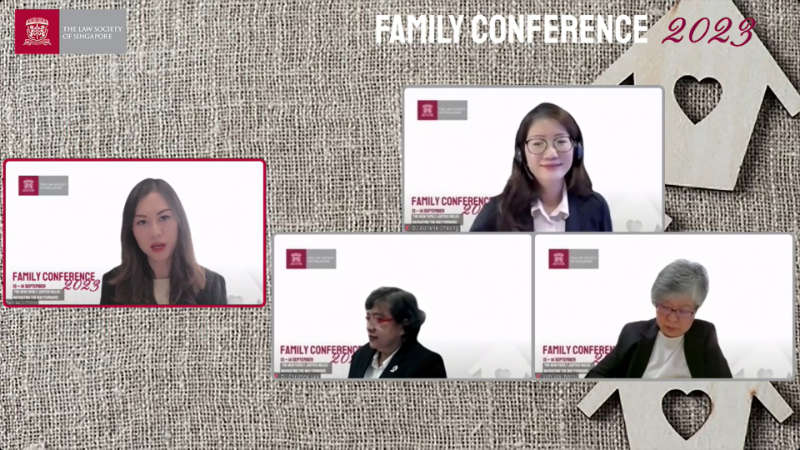
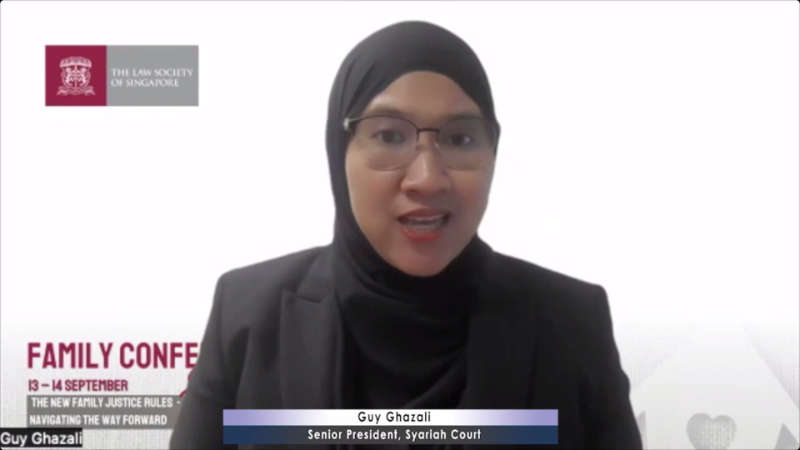
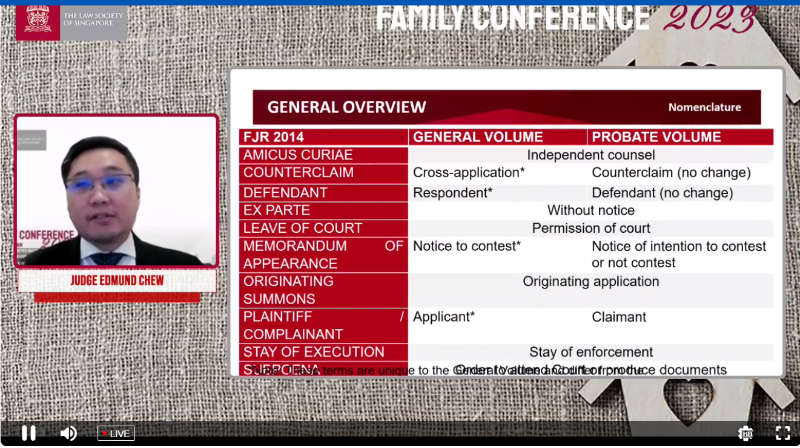
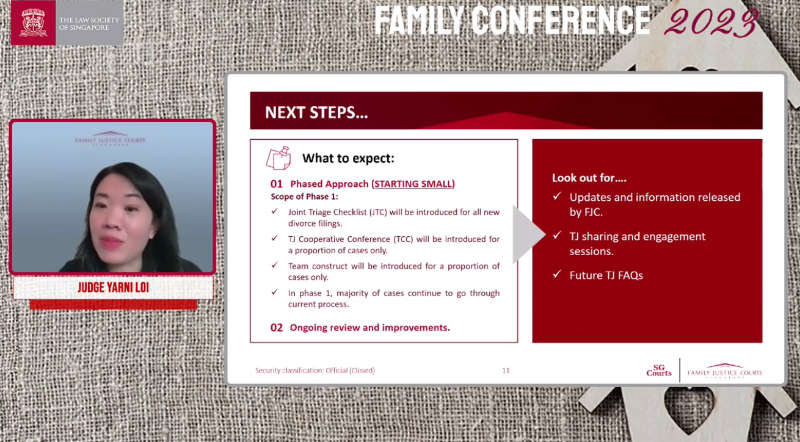
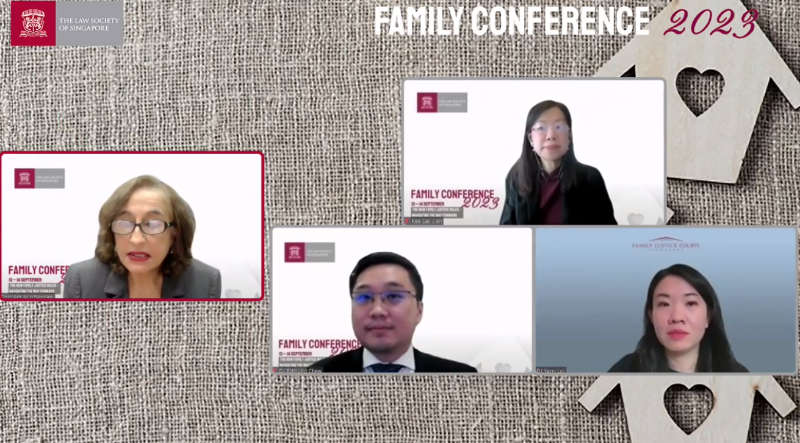
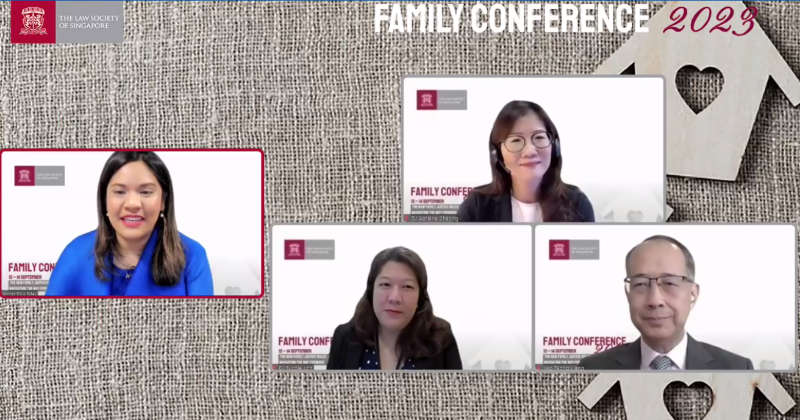
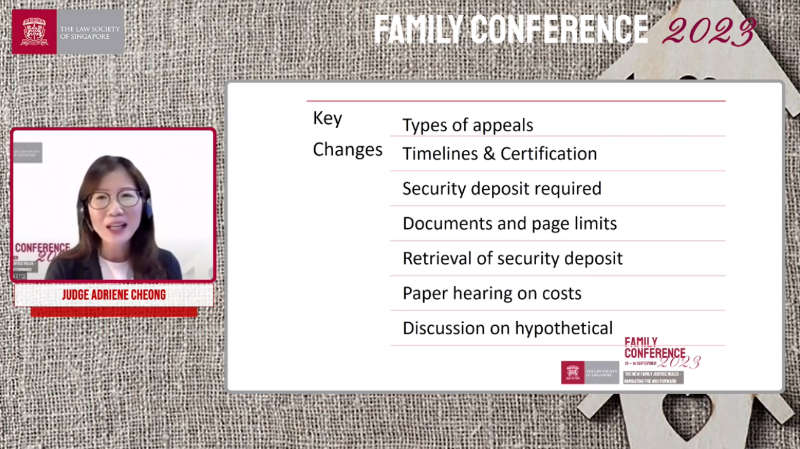
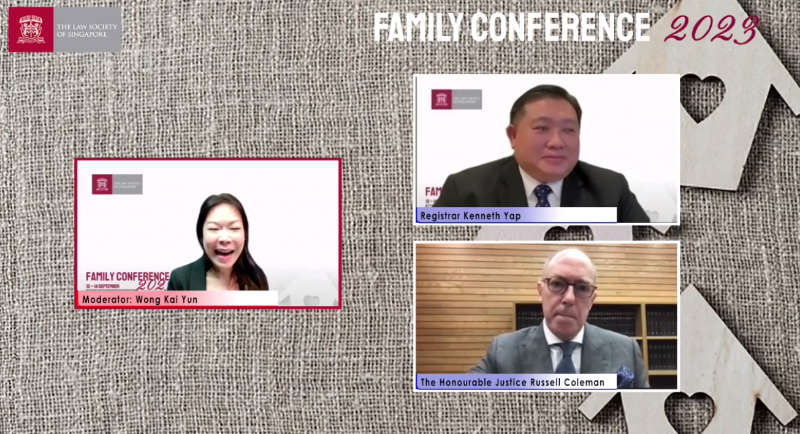
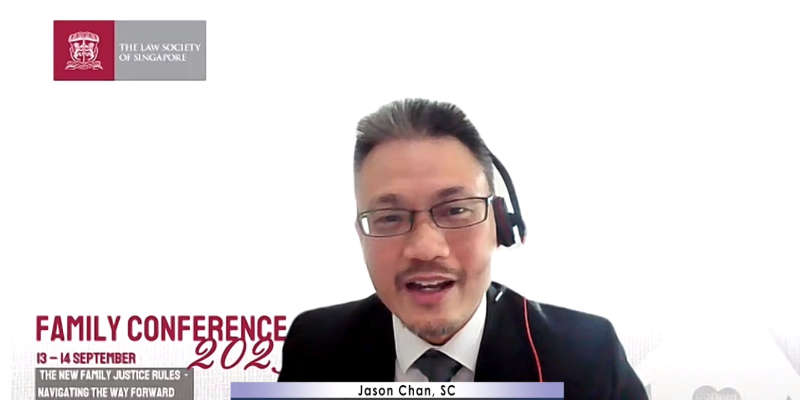
In this period of post-COVID innovation, the only thing certain is change. With the question of AI taking over lawyering looming in the horizon and the question of how legal tech and working from home changes the nature of practice, one thing I know for certain is this: the legal profession adapts with the times and will always find new ways to practice.
One way that I have found useful to keep myself up to date with the latest developments in Family practice is by attending the annual Family Conference.
This year’s Family Conference 2023 was held over two days on 13 and 14 September 2023. Much time was spent discussing the new Family Justice Rules and the further developments in the TJ jurisprudence. However, a refreshing change was made to the format of the programme – there were two specialised master classes that were conducted over both days. This allowed for those who were interested in just the conference to attend the conference itself while those who were interested in these more specialised topics to attend the masterclass. I considered this a masterful stroke.
While the Family Conference was still conducted online, the Master Classes were held in person at Maxwell Chambers – post-COVID, this allowed for much needed interaction. With the Family Justice Courts conducting many of its court sessions online (the last time I stepped into the Family Court either at Havelock or Maxwell was pre-COVID), the catching up with old friends and exchanging greetings is solely missed.
Day 1’s masterclass was conducted by the President of the Syariah Court, Ms Raihanah Binte Halid where she spoke about the “Principles of Muslim Inheritance Law” (FARAID). It was expertly moderation by Mr Norhakim Shah, the vice-chairperson of the Law Society’s Muslim Law Practice Committee. Held at Maxwell Chambers, it was well attended by around 50 practitioners. I had keen interest in Muslim Inheritance Law having assisted a few Muslim families, over the years, in obtaining their Letters of Administration. Hearing Ms Raihanah, who is an expert in this area was illuminating. One thing that I learnt was that the beneficiary of a Muslim will is not a FARAID beneficiary.
During the Q&A, I asked a question on how would we advise the family if they asked us which school of Muslim law did the decease belong to, it was interesting to note that the default position would be that if they are Malay, they are of the Shafii tradition. However, if they were of the Hanafi tradition, it could be because they were Indian-Muslims who did their prayers at a particular mosque in Singapore. That being said, I was then reminded later during tea-break later, that Muslims in Singapore would largely do their prayers in the mosque that is the closest to where they are – thus it is possible that while they still subscribed to one school while attend the school of another’s mosque.
In any case, I went away with a much greater appreciation of Muslim estate planning and why you ought to seek the right legal adviser to advise you on it, someone who is well versed in Muslim inheritance law and succession.
Day 2’s master class was a double-treat – one session was on Written Advocacy where we had two master speakers – Judge Michelle Elias – District Judge, Family Justice Courts and Mr Randolph Khoo, the Managing Director (Dispute Resolution), Drew & Napier LLC. This session was moderation by Ms Hu Huimin, Partner in CNP Law. Going through a few very interesting hypotheticals that had been disseminated to participants a few days before, we participants had the opportunity to discuss and attempt to draft submissions as a group before presenting it to the rest of the class. It was insightful in hearing the comments coming straight from the panel, on how the submissions could be improved or made tighter.
The second session was on cross-examination. Now this was a class that I was looking forward to. The number of family cases that goes onto trial is very few, credit being given to the great Family Mediation System that we have in the Family Justice Court and by the various mediation centres. That also means that unless you are a generalist, where you do trials for other civil or criminal matters or specialise in PPO or Maintenance trials, the opportunities for pure Family Law Specialist to do a trial, especially a divorce trial, is very low.
I have never laughed so hard at any Family Law Conference I attended. Much credit has to be given to the Oscar winning performance given by Ms Linda Ong, of Engelin Teh Practice LLC who played the witness in the mock trial. Expertly commented on by Judge Suzanne Chin – District Judge, Family Justice Court and Ms Engelin Teh SC, Managing Director, Engelin Teh Practice LLC and moderated by Ms Amelia Ang, Partner from Lee & Lee, the audience was left in stiches as the valiant volunteers to conduct cross examination tried to get the very creative and witty “witness” to admit to facts in their case theory. The experience shared my Ms Teh was also very illuminating to us in the audience, but what I really took away is this – that the fight for justice really takes hard work and carefulness to detail. Going all the way down to the scene of the alleged incident and observing the surroundings at a similar time when it happens and finding the key to win the case is a great example on going the extra mile in thoroughness in case preparation.
I enjoyed this format for Masterclasses at this Family Law Conference but more so, coming out of COVID and as a middle-category practitioner, in spite of the many new changes coming, this does not mean that there is going to be a lesser role for the family lawyer – I walk away being inspired that there is still much good work that can be done for family practice and many more years of practice to come.
Yue-En Chong
Managing Director
Bethel Chambers LLC






